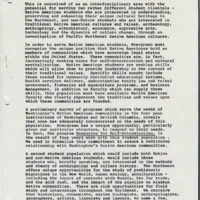Northwest Native American Cultural Studies: Proposed long range emphasis area, 1976
Item
-
Title
-
Northwest Native American Cultural Studies: Proposed long range emphasis area, 1976
-
Date
-
1976
-
extracted text
-
__:-
Proposed long range emphasis area
Northwest Native American Cult·u ral Studies
/
-
-
~
'-"" .
This is conceived of as an interdisciplinary area with the
potential for serving two rather different student clientele · Native American students who are interested in understanding,
preserving and enhancing their unique cultural heritage in ·
the Northwest, and non-Nativ·e students who are interested in
traditional Native American cultures and values, archaeology,
anthropology, ethnohistory, economics, expressive arts,
technology and the dynamics of culture change, through an
investigation of Pacific Northwest Native American cultures.
In order to serve Native American students, Evergreen must
recognize the unique position that Native Americans hold as
members of communities which have sovereign legal status
within the United States. These communities are, in fact,
increasingly seeking means for self-determination and cultural
revitalization. Native American students are seeking skills
which will allow them to provide leadership in the context of
their traditional values. Specific skills sought include
those needed for community controlled educational systems,
health servic~s delivery, understanding treaty law and tribal
·.government, fisheries and aquaculture programs, and business
management. In addition to faculty which can supply these
skills, this population must have available Native American
faculty who clearly represent the traditions and values upon
which these communities are founded.
A preliminary survey of programs which serve the needs of
Washington's Native American communities in the four year
institutions of ~'lashington and British Columbia, reveals
that none has adequately concentrated on the needs of this
population. Evergreen has a unique opportunity, particularly
given our curricular structure, to respond to their needs.
In fact, the program Resources for Self-Determination, is
the result of four years work w~th this student population . .
We need to formalize this comrnittment to assure a continuing
relationship with Washington's Native American communities.
A second student population which could include both Native
and non-Native American students, would include those
students who, broadly speaking, are interested in the methods
and theory of anthropology and culture history. The Northwest
offers unique opportunities for the study of prehistoric
migrations to the New World, human ecology, acculturation including the impact of contacts with Russia, the fur trade,
and the gold rush, a~d the impact of the pipeline on Alaskan
Native communities. There are rich opportunities for field
study and internships throughout the Northwest. We conceive
that historians, .economists, marine biologists, anthropologists,
geographers, artists, linguists and lawyers, to name a few,
would bring useful tools to a program with a Northwest focus.
�No~thwest Native American Cultural Studies, cont.
The conceptualization of this program area is unique in
that it focuses on the native populations of the Northwest.
The study of Native American culture and the interests of
Native American students in law, business, environmental
sciences; etc. create a natural overlap with many of the
6ther areas identified as areas of Evergreen faculty strength.
Mary Ellen Hillaire
Elizabeth Diffendal
Lynn Patterson
 1973-86_NAS_8D38_02_04
1973-86_NAS_8D38_02_04